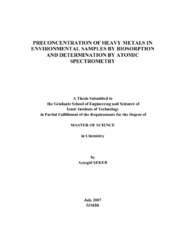Please use this identifier to cite or link to this item:
https://hdl.handle.net/11147/3635Full metadata record
| DC Field | Value | Language |
|---|---|---|
| dc.contributor.advisor | Eroğlu, Ahmet Emin | - |
| dc.contributor.author | Şeker, Ayşegül | - |
| dc.date.accessioned | 2014-07-22T13:52:00Z | - |
| dc.date.available | 2014-07-22T13:52:00Z | - |
| dc.date.issued | 2007 | - |
| dc.identifier.uri | http://hdl.handle.net/11147/3635 | - |
| dc.description | Thesis (Master)--İzmir Institute of Technology, Chemistry, İzmir, 2007 | en_US |
| dc.description | Includes bibliographical references (leaves: 75-83) | en_US |
| dc.description | Text in English; Abstract: Turkish and English | en_US |
| dc.description | xi, 83 leaves | en_US |
| dc.description.abstract | In the assessment of environmental quality, one of the priorities must be given to the determination of heavy metals. In the present study, Spirulina platensis, a cyanobacteria (or blue-green alga) was suggested to be used as a biosorbent prior to the atomic spectrometric determination of Pb, Cd and Ni in some environmental samples. For this purpose, the parameters which might be effective on the biosorption were investigated such as pH, time, initial metal ion concentration, biosorbent amount, temperature, kinetics of sorption, repetitive reactivity and ionic competition. According to the sorption kinetics, results obeyed well the pseudo second-order model. Freundlich, Dubinin Radushkevich and Temkin isotherm models were applied in describing the equilibrium partition of the ions. Freundlich isotherm was applied to describe the design of a single-stage batch sorption system. Thermodynamic parameters (.G0, .H0 and .S0) were calculated and the sorption process was found to be largely driven towards the products and it had an endothermic nature. Faster adsorption kinetics was observed for Pb2+ ions in comparison to Cd2+ and Ni2+ ions. Based on kinetic modeling, the apparent activation energy, Ea, was calculated to be 44 kJmol-1, -16 kJmol-1 and 54 kJmol-1 for Pb2+, Cd2+and Ni2+, respectively. The measurements of the repetitive reusability of Spirulina platensis indicated a large capacity towards the three metal ions. Sorption activities in a three metal ion system were studied and at an initial metal concentration of 100.0 mgL-1, % Pb2+ was found to be still high (85%).However, it decreased to less than 20% for Cd2+ and Ni2+ indicating the relative selectivity of the biosorbent towards Pb2+. Finally, the use of Spirulina platensis, in its natural form or after be immobilized onto various matrices (alginate, silicate, carboxymethylcellulose and polysulfone) was planned for the separation of heavy metals from the sample matrix. | en_US |
| dc.language.iso | en | en_US |
| dc.publisher | Izmir Institute of Technology | en_US |
| dc.rights | info:eu-repo/semantics/openAccess | en_US |
| dc.subject.lcc | QR92.M45 S46 2007 | en |
| dc.subject.lcsh | Heavy metals--Absorption and adsorption | en |
| dc.subject.lcsh | Atomic spectroscopy | en |
| dc.subject.lcsh | Spirulina platensis--Biotechnology | en |
| dc.subject.lcsh | Cyanobacteria | en |
| dc.title | Preconcentration of Heavy Metals in Environmental Samples by Biosorption and Determination by Atomic Spectrometry | en_US |
| dc.type | Master Thesis | en_US |
| dc.institutionauthor | Şeker, Ayşegül | - |
| dc.department | Thesis (Master)--İzmir Institute of Technology, Chemistry | en_US |
| dc.relation.publicationcategory | Tez | en_US |
| dc.identifier.wosquality | N/A | - |
| dc.identifier.scopusquality | N/A | - |
| item.openairecristype | http://purl.org/coar/resource_type/c_18cf | - |
| item.languageiso639-1 | en | - |
| item.openairetype | Master Thesis | - |
| item.grantfulltext | open | - |
| item.fulltext | With Fulltext | - |
| item.cerifentitytype | Publications | - |
| Appears in Collections: | Master Degree / Yüksek Lisans Tezleri Sürdürülebilir Yeşil Kampüs Koleksiyonu / Sustainable Green Campus Collection | |
Files in This Item:
| File | Description | Size | Format | |
|---|---|---|---|---|
| T000627.pdf | MasterThesis | 23.09 MB | Adobe PDF |  View/Open |
CORE Recommender
Page view(s)
170
checked on Mar 31, 2025
Download(s)
84
checked on Mar 31, 2025
Google ScholarTM
Check
Items in GCRIS Repository are protected by copyright, with all rights reserved, unless otherwise indicated.